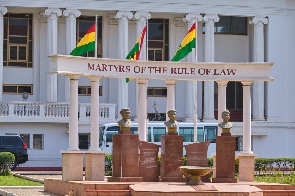Introduction
The 2020 Presidential Election petition intitule John Dramani Mahama versus Electoral Commission & Nana Addo Dankwa Akufo-Addo continue to produce a mixture of tense and humorous moments. One of the humorous moments arose when the wig is worn by Counsel for 2nd Respondent, Mr. Akoto Ampaw attracted a jovial comment from the Bench. On why the Learned Counsel has not changed his wig over a long time judging from the apparently faded wig, he responded: “My Lord, it gives it a unique identity.”
The above response of the learned Counsel has gained a good place among the list of interesting comments emanating from the 2020 Presidential Election petition. In view of the public interest and humour generated by the comments, the writers deem it propitious to share some basic information about the dress code of Lawyers and the secret of wearing old or faded wigs by some lawyers.
Origin of lawyers’ wigs
Until the 17th Century, Lawyers were expected to appear in court with clean, short hair and beards. Wigs made their first appearance in a courtroom simply because of the special appeal it gained outside the courtroom. It is recorded that wigs were made essential wear for polite society during the reign of Charles II (1660-1685). Initially, the Courts were adamant in switching to the new ‘elite dress code’. This is evidenced by the fact that portraits of Judges from the early 1680s showed Judges defiantly sporting their own natural hair.
Wigs started appearing around the 16th Century when Louis XIV gave impetus to the wearing of wigs in Britain. As wigs became more popular, they became more ostentatious, longer and curlier. In the mid-17th Century, sexually transmitted diseases such as syphilis became rampant. A bald scalp was considered a symptom of the disease. Therefore, the king disguised his scalp by wearing a wig. This trend quickly spread throughout the upper and middle-classes in Europe. The Courts, however, continued to reject the wearing of the wigs in the courtroom until 1685.
Regulation of Ghana’s legal profession and wearing of wigs
The law that regulates Ghana’s legal profession is the Legal Profession Act, 1960 (Act 32). This law, inter alia, establishes the General Legal Council and vests it with the mandate to arrange Ghana’s legal education and uphold standards of professional legal practice of Lawyers. The 13-member Council is chaired by His Lordship Justice Anin Yeboah.
The dress code of lawyers including the wigs are sanctioned by the General Legal Council in accordance with Council’s mandate to uphold professional conduct of the Lawyers in Ghana.
Significance of lawyers’ wigs
The wearing of wigs by members of the legal fraternity is said to give a sense of formality and solemnity of judicial proceedings. It is recalled that, on 23rd October 2017, the then Chief Justice, Her Ladyship Sophia Akuffo caused the former Judicial Secretary, Justice Alex B. Opoku Acheampong to issue a circular to Lawyers directing them to wear their wigs and gowns during all court proceedings. The circular enumerated three reasons to support the directive. The reasons were:
i. To preserve the tradition and the uniqueness of the work of Judges and Lawyers;
ii. To provide the needed protection and anonymity for Judges and Lawyers to enhance their personal security;
iii. To restore the formal nature of the court proceedings and eliminate the creeping casualness in the system.
Does the age of the wig matter?
It is interesting to note that the age of the wig matters a lot in the legal profession. It is a function of respect and privilege. One of the cardinal tenets of the legal profession is reverence for seniority. Senior Lawyers are accorded high respect, and privileges both inside and outside the courtroom. This tenet emphasises the highest premium that the profession places on experience. The wig is one of the demonstrable elements of a Lawyer’s longevity at the Bar. The older the wig worn the stronger the presumption that the wearer is a senior member of the Bar.
Conclusion
The wigs, collars, bibs, and gowns continue to dominate our courtrooms and our screens during the live telecast of the ongoing presidential election petition despite scathing criticisms by some members of the Bar and sections of the general public. The Dean of the University of Ghana School Of Law, Professor Raymond Atuguba is reported to have said “… it is absurd for Judges and Lawyers in Ghana to continue wearing collars, bibs, wigs and gowns as the dress code.”
In contrast to the above, the Chief Justice, His Lordship Justice Anin Yeboah has openly declared his support for the continuous wearing of the dress code. His Lordship is reported to have made the declaration during his public vetting in 2019. On the question as to whether he would abolish the wearing of wigs by Judges and Lawyers if he was appointed to the high office, he responded: “That’s our uniform; I’m all out for the tradition of the Bar. I will not change it."
The writers respectfully associate themselves with the unequivocal endorsement of the venerable Chief Justice. The authors beg to add that the age of a Lawyers’ wig matters a lot. It is axiomatic that the older a Lawyer’s wig, the older he or she is at the Ghana Bar. And the greater the pride!
Opinions of Friday, 19 February 2021
Columnist: Kings law



















